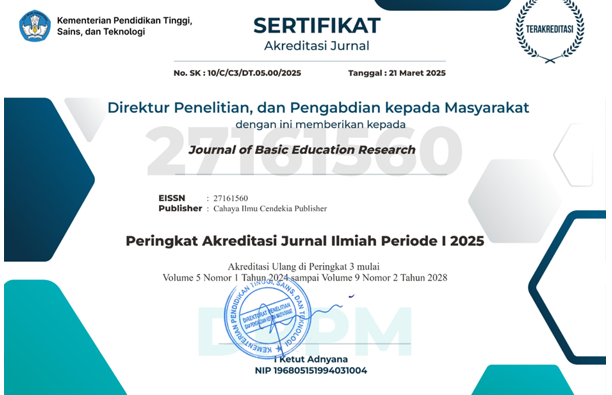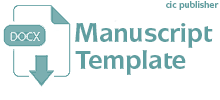School Literacy Movement Educational Program in Shaping the Reading Character of Elementary School Students: Using the CIPP Model
Abstract
Purpose of the study: This study aims to evaluate the effectiveness of the School Literacy Movement (GLS) in fostering a reading habit among elementary students using the CIPP evaluation model.
Methodology: The study used a qualitative case study design. Data were collected through structured interviews, direct observations, and document analysis. The CIPP model (Context, Input, Process, Product) was used as the evaluation framework. Triangulation and Miles & Huberman's interactive model were applied for data validation and analysis.
Main Findings: Schools with strong leadership, teacher involvement, and community support were more effective in implementing GLS. Activities such as daily reading routines, reflective journals, and integrated literacy learning contributed to students' enthusiasm and consistent reading habits. Schools with weak support structures lacked systemized literacy outcomes.
Novelty/Originality of this study: of this Study: This study offers a comprehensive evaluation of GLS using the full CIPP framework, integrating contextual and systemic factors rarely examined in previous studies. It provides evidence-based insights on how program alignment influences sustainable literacy character development in elementary education.
References
D. I. Susanti and J. Y. Prameswari, “Implementasi kebijakan gerakan literasi sekolah (GLS),” Journal Sinasis, vol. 2, no. 1, pp. 264–273, 2021.
N. A. Fairuza, “Program gerakan literasi sekolah sebagai upaya peningkatan kemampuan literasi siswa di sekolah dasar,” Journal November, 2020.
OECD, PISA 2022 Results: What Students Know and Can Do. OECD Publishing, 2024.
P. Wiedarti and others, “Desain Induk Gerakan Literasi Sekolah.” Direktorat Jenderal Pendidikan Dasar dan Menengah Kementerian Pendidikan dan Kebudayaan, Jakarta, 2019.
C. M. M. Gontijo, “Literacy in UNESCO’s Fundamental Education Program,” Educ. Pesqui., vol. 50, p. e265044, 2024, doi: 10.1590/s1678-4634202450265044en.
M. Khasanah and A. M. Putri, “Penguatan literasi, numerasi, dan adaptasi teknologi pada pembelajaran di sekolah,” Eksponen, 2022, doi: 10.47637/eksponen.v11i2.381.
M. Yamin, “Enhancing Teachers’ Literacy Competence through Critical Writing in Digital Era,” International Journal of Pedagogy and Teacher Education, 2018, doi: 10.20961/IJPTE.V2I2.24118.
I. F. R. Sari, “Konsep dasar gerakan literasi sekolah pada permendikbud nomor 23 tahun 2015,” Al-Bidayah: Jurnal Pendidikan Dasar Islam, vol. 10, no. 1, pp. 89–100, 2018, doi: 10.14421/al-bidayah.v10i1.131.
R. Setiawan and others, “Panduan gerakan literasi sekolah di sekolah dasar.” direktorat jenderal pendidikan dasar dan menengah kementerian pendidikan dan kebudayaan, 2019. doi:10.31004/basicedu.v5i3.939
A. Ambarwati, J. Sulianto, and M. Azizah, “Program gerakan literasi sekolah di sd negeri sidomulyo 2 demak semester ganjil tahun 2021/2022,” DIKDAS MATAPPA: Jurnal Ilmu Pendidikan Dasar, 2022, doi: 10.31100/dikdas.v5i2.1629.
H. Sinaga, “Penerapan pembiasaan literasi dalam meningkatkan minat baca peserta didik di sekolah dasar negeri 095205 parbalokan,” Journal on Education, 2023, doi: 10.31004/joe.v5i4.2362.
R. A. Pusparini and M. S. M. P. D. R. D. Utami, “Perkembangan literasi membaca dalam menyongsong pembelajaran abad 21 di SD muhammadiyah 16 surakarta tahun pelajaran 2018/2019,” 2019.
A. R. Daniar and W. Rosdiana, “Implementasi Gerakan Literasi Sekolah Di Sekolah Dasar Negeri Sedati Gede 2 Sedati Kabupaten Sidoarjo,” Publika, pp. 25–36, 2021, doi: 10.26740/publika.v9n1.p25-36.
N. M. Rusniasa, N. Dantes, and N. K. Suarni, “Pengaruh Gerakan Literasi Sekolah Terhadap Minat Baca Dan Hasil Belajar Bahasa Indonesia,” PENDASI: Jurnal Pendidikan Dasar Indonesia, vol. 5, no. 1, pp. 53–63, 2021.
S. S. Madeten, K. Kurniawan, S. A. Khotimah, N. F. Azzahra, and C. W. Gapo, “Increasing Interest In Reading Through the School Literacy Movement Program in Class IV State Elementary School 27 Pontianak Timur,” JIIP - Jurnal Ilmiah Ilmu Pendidikan, 2024, doi: 10.54371/jiip.v7i10.6049.
S. Q. Zatalini, R. Yuliana, and O. Rosidin, “Pembinaan karakter gemar membaca melalui program gerakan literasi sekolah di kelas iva SDN serang 3,” Pendas : Jurnal Ilmiah Pendidikan Dasar, 2023, doi: 10.23969/jp.v8i1.8784.
N. L. Ekayani and G. A. K. A. Suwedawati, “Implementation of the school literacy movement (GLS) in growing reading interest of the students,” International Journal of Multidisciplinary Sciences, 2023, doi: 10.37329/ijms.v1i2.2279.
M. S. Kaswan and R. Rathi, “Analysis and modeling the enablers of green lean six sigma implementation using interpretive structural modeling,” Journal of Cleaner Production, 2019, doi: 10.1016/J.JCLEPRO.2019.05.253.
E. Eliwatis, A. Syarosy, R. Maimori, S. Susrizal, D. Demina, and A. Mudinillah, “Profesionalitas guru dalam mengimplementasikan pembelajaran PAI berbasis kurikulum merdeka,” EDUKASIA: Jurnal Pendidikan dan Pembelajaran, vol. 5, no. 1, pp. 463–468, 2024, doi: 10.62775/EDUKASIA.V5I1.722.
R. Kurnia and Y. Nurhayati, “Development of inquiry-based student worksheets (LKPD) on mathematics subject in the material of cubes and blocks to improve mathematical understanding of …,” … : Journal of Primary Education, no. Query date: 2024-08-23 09:35:18, 2020, [Online]. Available: http://e-journal.stkipsiliwangi.ac.id/index.php/primaryedu/article/view/1468
I. H. Noor, A. Izzati, and M. Z. Azani, “Implementasi kurikulum merdeka pada mata pelajaran pendidikan agama islam,” Iseedu: Journal of Islamic Educational Thoughts and Practices, vol. 7, no. 1, pp. 30–47, 2023, doi: 10.23917/iseedu.v7i1.22539.
D. A. Dewi, H. I. Dewi, and D. Wicaksono, “Externalities of the implementation of creative learning model in the independent learning curriculum in public elementary schools,” Jurnal Holistika, 2024, doi: 10.24853/holistika.8.2.99-109.
Sugiyono, Memahami Penelitian Kualitatif. Bandung: Alfabeta, 2005.
M. B. Miles, A. M. Huberman, and J. Saldana, Qualitative data analysis: A methods sourcebook, 3rd ed. SAGE Publications, 2014.
A. Rukajat, Pendekatan Penelitian Kualitatif. Deepublish, 2018.
Aslinar, N. Usman, and Khairuddin, “Exploring the role of school principals in enhancing literacy culture in south aceh public high schools,” International Journal of Educational and Life Sciences, 2025, doi: 10.59890/ijels.v3i2.329.
K. Anwar, Mujamil, and N. Na’im, “Principal behavior in improving literacy cultur,” World Journal of Advanced Research and Reviews, 2024, doi: 10.30574/wjarr.2024.21.3.0829.
Nurmiati, S. M. Sari, and Musdiani, “The impact of the principal’s leadership on the role of teachers in implementing school literacy activities,” Indonesian Journal of Instructional Media and Model, 2024, doi: 10.32585/ijimm.v6i1.5252.
J. B. Stiff, J. Lenkeit, T. N. Hopfenbeck, H. L. Kayton, and J. McGrane, “Research engagement in the progress in international reading literacy study: A systematic review,” Educational Research Review, 2023, doi: 10.1016/j.edurev.2023.100547.
C. M. King, “Metacognition or ‘B.S.’? examining student reading practices in reading journals,” Pedagogy, vol. 20, pp. 473–498, 2020.
A. Fakhruddin, “Reading journal as a way to improve students’ reading comprehension,” ETERNAL (English Teaching Journal), 2018, doi: 10.26877/ETERNAL.V8I2.2824.
B. Plaatjies, “Investigating principal capacity in literacy Instructional leadership at selected primary schools,” Journal of Social Studies Education Research, vol. 10, pp. 136–160, 2019.
E. R. Dewi, S. Samudi, H. Hasmirati, S. Sujariati, and A. S. I. I. Hartawat, “Pengelolaan Digitalisasi Belajar Melalui Literasi Terpadu,” JOURNAL OF TRAINING AND COMMUNITY SERVICE ADPERTISI (JTCSA), 2023, doi: 10.62728/jtcsa.v3i2.451.
D. Tamala, “Peran guru dalam meningkatkan literasi membaca pada siswa sekolah dasar,” Journal of Innovation in Teaching and Instructional Media, 2024, doi: 10.52690/jitim.v5i1.931.
J. Williamson, H. Hedges, and R. Jesson, “Storybook reading: Literacy and teacher knowledge in early childhood education,” Journal of Early Childhood Literacy, 2023, doi: 10.1177/14687984231214990.
A. Ahern, “Learning to plan for CLIL with the reading to learn approach. an experience in initial teacher training.,” Didacticae: Revista de Investigación en Didácticas Específicas, 2023, doi: 10.1344/did.2023.14.107-125.
Y. Wulandari and D. Mardiana, “Analisis Gerakan Literasi Baca Tulis di Kelas II PUBLIC ALEMENTARY CCHOOL-12 Palangka Kota Palangkaraya,” Jurnal Pendidikan Dasar dan Menengah, 2024, doi: 10.69743/edumedia.v2i1.26.
T. Irawan and D. Harmaen, “Pengaruh gerakan literasi sekolah terhadap kreativitas siswa (nasional),” Didaktik : Jurnal Ilmiah PGSD STKIP Subang, 2023, doi: 10.36989/didaktik.v6i2.739.
A. A. Nikmah, Masturin, and A. A. Zafi, “Management of school literacy movement (gls) program in developing interest in literacy among students,” Esteem Journal of English Education Study Programme, 2025, doi: 10.31851/esteem.v8i1.18138.
S. Soleah, R. Malik, and A. Riafadilah, “Evaluasi program gerakan literasi sekolah (gls) di sd negeri salatuhur kecamatan anyar,” TADRUSUUN: JURNAL PENDIDIKAN DASAR, 2022, doi: 10.62274/tadrusuun.v1i2.17.
D. L. Stufflebeam, “The CIPP model for evaluation,” in International Handbook of Educational Evaluation, T. Kellaghan and D. L. Stufflebeam, Eds., Kluwer Academic Publishers, 2003, pp. 31–62. doi: 10.1007/978-94-010-0309-4_4.
Copyright (c) 2025 Anita Cahyani, St Y Slamet, Sudiyanto Sudiyanto

This work is licensed under a Creative Commons Attribution 4.0 International License.
Authors who publish with this journal agree to the following terms:
- Authors retain copyright and acknowledge that the Journal of Basic Education Research is the first publisher licensed under a Creative Commons Attribution 4.0 International License.
- Authors are able to enter into separate, additional contractual arrangements for the non-exclusive distribution of the journal's published version of the work (e.g., post it to an institutional repository or publish it in a book), with an acknowledgment of its initial publication in this journal.
- Authors are permitted and encouraged to post their work online (e.g., in institutional repositories or on their website) prior to and during the submission process, as it can lead to productive exchanges and earlier and greater citation of published work.





.png)


.png)
.png)


















